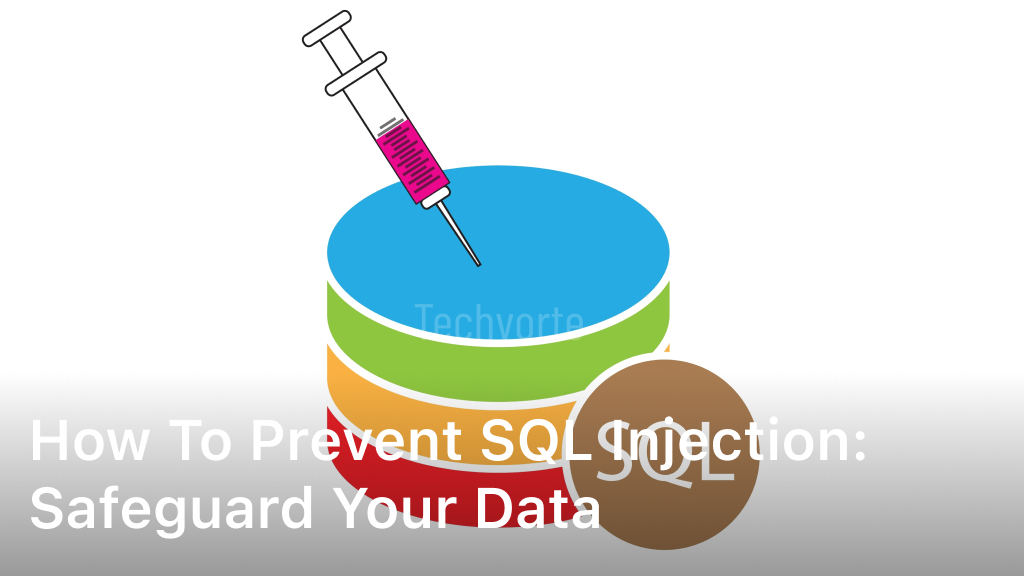Hello again Tech Vorte readers! In today’s digital age, where data breaches and cyberattacks are rampant, protecting your systems against SQL injection attacks is crucial.
SQL injection is a type of code injection attack that exploits vulnerabilities in an application’s software, allowing attackers to interfere with the queries that an application makes to its database.
By manipulating these queries, attackers can access, modify or delete data stored in the database, leading to severe consequences for businesses and individuals alike.
Understanding SQL Injection Attacks
What is SQL Injection?
SQL injection occurs when an attacker inserts malicious SQL code into input fields or URLs, tricking the application into executing unintended SQL commands.
How Does SQL Injection Work?
Attackers exploit vulnerabilities in poorly sanitized user inputs to inject SQL commands into the application’s SQL queries, enabling them to bypass authentication, extract sensitive data or execute administrative tasks.
Best Practices to Prevent SQL Injection
There are several effective techniques and strategies you can adopt to prevent SQL injection in your applications.
One of the first steps is to ensure that your application validates all input data.
This can be achieved through input validation techniques, such as data type checking and length restrictions, to ensure that only acceptable data is entered into the database.
Another important technique is the use of prepared statements and parameterized queries.
These methods effectively separate the SQL code from the data, preventing any potential injection of malicious code.
Furthermore, they allow for specific data parameters to be passed through the query, avoiding any direct concatenation of user input into the SQL command.
In addition to these techniques, it is important to implement a strong security framework for your application.
This can include measures such as encrypting sensitive information, implementing multi-factor authentication, and utilizing firewalls.
Regularly updating your application and applying security patches can also help in minimizing vulnerabilities and potential security breaches.
With these strategies in place, you can ensure that your database remains secure from SQL injection attacks.
Securing the Database from SQL Injection
Preventing SQL injection attacks requires more than just implementing best practices.
Additional measures must be taken to secure your database from potential threats.
By restricting access to the database through the principle of least privilege, you greatly reduce the risk of unauthorized access through SQL injection vulnerabilities.
Another critical technique is strict error handling.
Meaning, the application should never display error messages that reveal sensitive database information.
Instead, provide sanitized error messages or create custom error pages.
Regularly scheduled vulnerability assessments can also help identify weak spots, providing an opportunity to address potential issues before they become real problems.
Remember, prevention is key when it comes to SQL injection attacks.
Taking a proactive approach to database security can prevent catastrophic consequences that can result from successful SQL injection attacks.
Utilizing these techniques in conjunction with best practices significantly enhances the security level of your database.
Testing for SQL Injection Vulnerabilities
Regularly testing your application for SQL injection vulnerabilities is a crucial step in ensuring the security of your data.
Fortunately, there are several techniques and tools available for identifying potential vulnerabilities.
Manual Testing
Manual testing involves examining your application’s inputs and outputs and trying to inject malicious SQL code into them.
By attempting different SQL injection techniques, you can identify potential vulnerabilities and test the effectiveness of your preventive measures.
Some common SQL injection techniques include:
- Boolean-based exploitation
- Error-based exploitation
- Time-based exploitation
- Union-based exploitation
By successfully injecting SQL code, you can gain access to sensitive data, modify or delete data or even take over the entire application.
Identifying vulnerabilities with manual testing is an essential step in protecting your data from SQL injection attacks.
Automated Tools
Automated tools can also be used to test your application for SQL injection vulnerabilities.
These tools scan your application for potential weaknesses and can save you time compared to manual testing.
Some popular SQL injection testing tools include:
- SQLMap
- Burp Suite
- Netsparker
- Acunetix
While automated tools can be useful, they are not foolproof and may miss some vulnerabilities.
Therefore, it’s important to use them in conjunction with manual testing for optimal results.
Regularly testing your application for SQL injection vulnerabilities is an essential component of maintaining a secure application and protecting your valuable data.
By combining manual testing techniques with automated tools, you can identify and address potential vulnerabilities before they can be exploited.
Educating Developers on SQL Injection Prevention
Effective SQL injection prevention requires the entire development team to be well-informed about this security threat.
Developers play a critical role in safeguarding your valuable data from SQL injection attacks.
Regular education and training on secure coding practices can help to minimize the risk of SQL injection vulnerabilities in your application.
Educating your developers on the importance of input validation, parameterized queries and other techniques to mitigate against this security threat can help to ensure the overall security of your database.
Implementing Training Programs
Training programs designed to educate all levels of your development team on SQL injection prevention techniques can be highly effective.
Regularly scheduled training sessions, workshops and seminars can help to ensure that developers are up-to-date with the latest best practices in secure coding.
Using Realistic Examples
Realistic examples can be used to demonstrate the negative impact of SQL injection attacks and highlight the importance of secure coding practices.
Developers can learn best practices more effectively when these practices are demonstrated in context.
Providing Resources for Developers
Resources such as documentation, guides, and coding standards can be made available to developers to ensure that they follow secure coding practices.
Enforcing secure coding practices on a team-wide level can help to minimize the risk of SQL injection vulnerabilities in the application.
Overall, educating developers on SQL injection prevention is a critical step towards maintaining a secure application.
Consistent education, training and the availability of resources can help to ensure that all members of your development team are competent in implementing secure coding practices to safeguard your data against SQL injection attacks.
Conclusion
Preventing SQL injection attacks should be a top priority for anyone who values the security of their data.
By adopting best practices such as input validation, parameterized queries and implementing a strong security framework, you can significantly reduce the risk of SQL injection attacks.
It is also essential to secure your database by implementing measures such as least privilege access, strict error handling, and regular vulnerability assessments.
Regularly testing your application for vulnerabilities and educating your development team on SQL injection prevention are also critical steps towards maintaining a secure application.
In conclusion, protecting against SQL injection attacks requires a combination of vigilance, best practices and education.
By following these steps, you can help safeguard your valuable data and prevent SQL injection attacks from causing irreparable harm to your application and business.
FAQ
What is SQL injection?
SQL injection is a common cyber attack technique where malicious actors exploit vulnerabilities in an application’s database to manipulate or access confidential data, execute unauthorized commands, or even gain control over the entire database.
How does SQL injection work?
SQL injection typically occurs when an application fails to properly validate and sanitize user input before constructing SQL queries. Attackers can then insert malicious SQL statements as input, which are executed by the application’s database, compromising its integrity and exposing sensitive information.
What are the risks of SQL injection attacks?
SQL injection attacks can have severe consequences, including unauthorized data disclosure, modification, or deletion. Attackers can bypass authentication systems, extract sensitive information, compromise user privacy, gain administrative privileges, or even corrupt the entire database.
How can I prevent SQL injection?
There are several best practices to prevent SQL injection. These include implementing input validation, using parameterized queries or prepared statements, enforcing strong authentication and access controls, regularly patching and updating your application and database software, and educating developers on secure coding practices.
How can I secure my database from SQL injection?
To secure your database from SQL injection, you should follow practices such as implementing the principle of least privilege, where database users have only the necessary permissions, practicing strict error handling to prevent sensitive information leakage, and conducting regular vulnerability assessments to identify and address any security gaps.
How can I test for SQL injection vulnerabilities?
Regularly testing your application for SQL injection vulnerabilities is important. You can use tools like SQLMap, OWASP ZAP, or Burp Suite to automatically scan for such vulnerabilities. Manual testing techniques, such as crafting malicious input and observing the application’s response, can also be effective.
Why is developer education important for SQL injection prevention?
Developer education plays a crucial role in preventing SQL injection attacks. By providing training and resources on secure coding practices, developers can become more aware of potential vulnerabilities and learn how to implement measures like input validation, parameterized queries, and other countermeasures to prevent SQL injection in their code.





